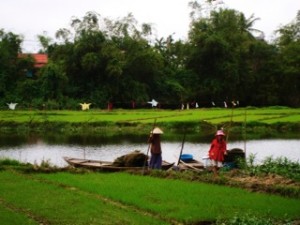Traveling In A Developing Country

Our blogger Anna Jen is back once again with some more insight into her travel experiences. This time she talks to you wonderful readers about her time travelling in developing countries; the ups, the downs and the best ways to get involved.
For me, no other experience compares to that of traveling. I love really taking the time to explore a country, and find what makes it beautiful and unique. Meeting people, hearing their stories, and seeing how they live; trying to communicate in the few words of the language of the country that you’re in and appreciating the kind smiles of the locals as you totally butcher the words; hostelling and living out of a backpack for weeks on end; eating so much food you make yourself sick but you keep eating because the cuisine is that good and you just have to try everything; jogging through a city in the early morning as it wakes; soaking in the sights and sounds of amazing places.
I had the opportunity to backpack through SE Asia a few years ago. I was working as an English and business teacher in China, and had a long break for the Spring Festival holiday. I figured I might as well take advantage of being in such close proximity to so many interesting countries, so the day after I administered my last final exam, I hopped on a plane for the first leg of my journey. Beginning in central China, I worked my way down through Vietnam, over to Cambodia, and then to Thailand, finishing with a couple of days in Taiwan. 6 weeks, 4 countries, 14 cities, countless memories, and about 2,000 pictures to document it all.
Traveling in a developing country has its perks. The biggest one is probably that everything is really cheap. You can do and eat and experience a lot for very little money. For example, I spent more money exploring Japan for 10 days, than I did in a month and a half in Southeast Asia.
Another great quality is that Western influence is limited so much of the local culture is preserved…there is not a McDonald’s or Starbucks on every corner. There are also, however, downsides…or what I like to call “adventures”. Transportation tends to be less organized (and rarely on time), there’s not as much of a concern for the environment, and there is a higher chance of being ripped off. In one city in Vietnam, it seemed like people tried to take advantage everywhere we went. Not knowing the language made it hard to avoid those types of situations.
The more you spend time in a developing country, the greater your awareness becomes that there is a pretty distinct difference between the locals and tourists. Over the past couple of years, many places in the developing world have become popular tourist destinations, where tourism makes up a huge part of the local economy, and the livelihoods of people and their families depend on it. Money is coming in from visitor traffic, but poverty is still very prevalent.
How do you justify spending a lot of money to travel, when people in the host countries are struggling to survive? Where’s the fine line between enjoying a vacation and supporting things that could be classified as human trafficking or child labor? I remember walking down Khao San Road, the touristy area of Bangkok, and a disabled man was begging for money. He seemed to get lost in the sea of foreigners who walked by and turned a blind eye.
It broke my heart and I couldn’t erase it from my mind and I sipped cocktails with friends at a bar just down the road. In Cambodia many children work as street vendors to help their families, instead of going to school. At the entrance to one of the magnificent Angkor temples, I met a three-year-old girl and her older sister who knew how to say “hello” and “thank you” and “please buy my postcards” in five different languages.
Now I’m not saying that we should all cease to explore the world around us, because we live on a fascinating planet full of amazing people and places. As Mark Twain said, travel is fatal to prejudice, bigotry, and narrow-mindedness…it’s necessary for humankind to learn from each other, be harmonious, and thrive. But travel it is also expensive and a luxury. And it can have a negative effect on the people in the host country.
As a self-proclaimed global nomad, who frequently daydreams about my next international adventure, I encourage you to be mindful when taking in the sights and sounds of a place. Know what’s going on around you, be sensitive to the local customs and people, and be intentional in how you spend your time and money.
There are even opportunities in many places to volunteer abroad. When I was in Siem Reap, Cambodia, the hostel owners also ran an orphanage and school, and travelers could volunteer some time at the school. Before you go to a country, research local organizations and charities where you can give your time, and contact them beforehand. Or you can ask around when you arrive. I can guarantee that spending some time investing in the local community will make your trip much more meaningful.
(Reach To Teach has more information on how to help out by volunteering abroad in either Vietnam or Cambodia)
Anna is an adventurous, creative, travel enthusiast who recently spent two and a half wonderful years living, working, and traveling around Asia. She really likes to explore a country, meet people, and find what makes a place beautiful and unique, while documenting it in words and pictures. Other interests include sports, coffee, running, good books, sunshine, pizza, and spending as much time as possible in the Great Outdoors. She’s currently working at a non-profit in Oregon, researching grad schools, and dreaming about her next trip abroad. Check out her blog at www.globalnomadanna.wordpress.




